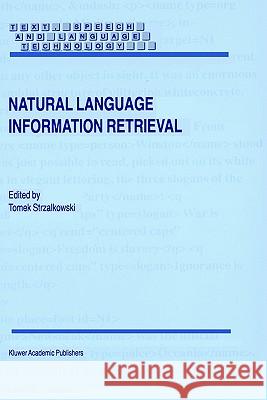Natural Language Information Retrieval » książka
Natural Language Information Retrieval
ISBN-13: 9780792356851 / Angielski / Twarda / 1999 / 384 str.
The last decade has been one of dramatic progress in the field of Natural Language Processing (NLP). This hitherto largely academic discipline has found itself at the center of an information revolution ushered in by the Internet age, as demand for human-computer communication and informa tion access has exploded. Emerging applications in computer-assisted infor mation production and dissemination, automated understanding of news, understanding of spoken language, and processing of foreign languages have given impetus to research that resulted in a new generation of robust tools, systems, and commercial products. Well-positioned government research funding, particularly in the U. S., has helped to advance the state-of-the art at an unprecedented pace, in no small measure thanks to the rigorous 1 evaluations. This volume focuses on the use of Natural Language Processing in In formation Retrieval (IR), an area of science and technology that deals with cataloging, categorization, classification, and search of large amounts of information, particularly in textual form. An outcome of an information retrieval process is usually a set of documents containing information on a given topic, and may consist of newspaper-like articles, memos, reports of any kind, entire books, as well as annotated image and sound files. Since we assume that the information is primarily encoded as text, IR is also a natural language processing problem: in order to decide if a document is relevant to a given information need, one needs to be able to understand its content."











